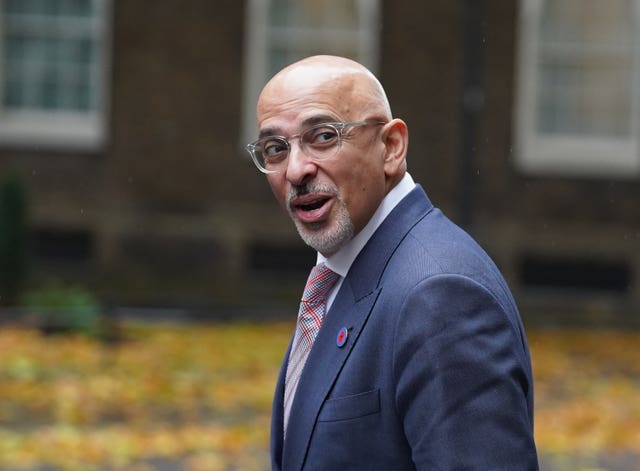
James O'Brien 10am - 1pm
4 December 2022, 16:34

Tory Party chairman Nadim Zahawi sparked union anger when he said industrial action was ‘exactly what Putin wants to see’.
Hundreds of troops are on stand-by to cover for ambulance crews, firefighters and Border Force staff as ministers prepare for a wave of strikes across public services in the run-up to Christmas.
The Cabinet Office said that about 2,000 military personnel, civil servants and other volunteers from across government have been training as part of the Government’s contingency planning.
They included up to 600 armed forces personnel and 700 staff from the Government’s specialist Surge and Rapid Response Team, as well as from other parts of the Civil Service.
Conservative Party chairman Nadhim Zahawi said it was the “right and responsible thing to do” as ministers sought to minimise the disruption to the public.
But he provoked a furious response from trade unions after he linked the strikes to the war in Ukraine, saying they are “exactly what Putin wants to see”.
Mr Zahawi argued that the cost-of-living crisis was the result of the energy price shock following Russia’s invasion of its neighbour and that above-inflation pay awards would simply “embed” inflation in the system.
“We’re coming up to Christmas, it’s unfair, in my view, for the unions to really damage and disrupt people’s lives and livelihoods at Christmas,” he told the BBC’s Sunday With Laura Kuenssberg programme.
“They should really rethink and they should reflect on this because that is exactly what Putin wants to see, that division.”
Royal College of Nursing general secretary and chief executive Pat Cullen angrily denounced his remarks “as a new low for this Government”.
“The public does not believe this kind of rhetoric and wants ministers to address our dispute,” she said.
“Record numbers of nurses are leaving because they feel undervalued and patients are paying the price.”

Unite general secretary Sharon Graham said his attempt to paint nurses and ambulance drivers as “allies of Vladimir Putin” was “as ridiculous as it is disgraceful”.
“Rather than running down our NHS in an act of catastrophic self-harm and threatening to bring in the military, the minister should instead ask himself why health staff are leaving in droves,” she said.
Unison head of health Sara Gorton said: “Instead of taking responsibility for trying to solve the growing staffing crisis, ministers want to ratchet up the rhetoric and pick fights with ambulance workers and their NHS colleagues. This won’t go down well with the public.”
The latest row erupted as a series of unions across public services are preparing to carry out strike action or ballot their members over pay as they seek to alleviate the squeeze on living standards from soaring inflation.
“Today, another multi-millionaire government minister has chosen to attack ordinary workers whose only crime has been to refuse to take a pay cut.
“Nadhim Zahawi's allegation that Britain's nurses, ambulance drivers and teachers are…” @UniteSharon 1/2 https://t.co/Rp4TCQTgjk
— Unite the union: join a union (@unitetheunion) December 4, 2022
As well as ambulance staff, nurses in the NHS are due to hold two days of strikes this month while junior doctors are also set to be balloted on industrial action.
There is expected to be widespread disruption to transport in the run up to Christmas with further rail strikes, walk-outs by baggage handlers at Heathrow and possible action by Border Force staff.
Meanwhile, the Fire Brigades Union is balloting its members and industrial action is continuing at the Royal Mail.
The Cabinet Office said no decisions had been taken yet on the deployment of troops, but that they were part of the “range of options available” should the strikes go ahead as planned.
The FBU strike ballot opens on Monday – and on Tuesday firefighters and control staff will make their voices heard in Westminster.
If you're an FBU member register your interest here: https://t.co/Ws5eU6P4z9 pic.twitter.com/DLHUmnzlGx
— Fire Brigades Union (@fbunational) December 2, 2022
Mr Zahawi said that while he was “absolutely conscious” of how difficult it was for many workers, the country simply could not afford inflation or above-inflation pay awards.
He said rising prices were being driven by higher energy costs due to Russian president Vladimir Putin’s war in Ukraine, as he appealed to unions to drop their demands.
“To ask for a 19% pay rise (for nurses) which would cost the NHS £10 billion I think is the wrong thing to do right now,” he told Sky News’s Sophy Ridge On Sunday programme.
“If you accept all the inflation-level pay rises, that is about £28 billion. It would cost every household just short of £1,000. That is unsustainable when we are trying to be fiscally disciplined and control inflation.”